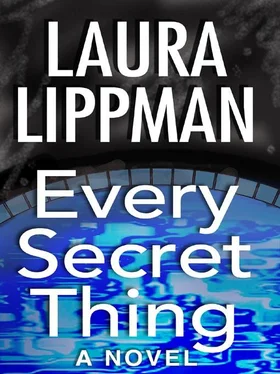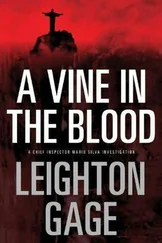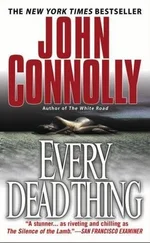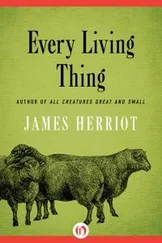“Except in the case of windchill,” said Lenhardt, interrupting his own story. “Then they use the lowest number. You know-the temperature will be thirty-seven degrees today, but it will feel like twenty below ! Tune back in at five and it may be thirty below! Our twenty-four-hour Doppler Radar Storm Center Hoo-Haw guarantees the most dire weather forecast in Baltimore, or your money back.”
Lenhardt had happened to be on his way home the night of the crash when he saw patrol cars and uniforms swarming. The human toll was miraculously light-the only Shock Trauma transports were two of the kids in the car, and as Lenhardt said later in his Lenhardt way, “Hard to get choked up about that .” The redheaded barmaid had a broken leg, and a couple of people caught broken glass, some of it flung from the ornaments on the demolished Christmas tree, which was the first thing the Isuzu hit after coming through the wall.
But the bar had lived to tell the tale, and the only visible change was the guardrail on the curve. On late nights, Lenhardt could be found at the curve of the reconstituted bar, or sitting at a plastic-covered table, buying rounds for his detectives.
“So that’s why you come here.” It was Nancy ’s first time at Wagner’s, because she usually said no and hurried home to Andy. But she needed to be one of the guys tonight, even at the risk of pissing Andy off.
“What?” Lenhardt said, playing dumb, no small play for him. “You trying to imply something about my choice of drinking establishments?”
“You picked this as your hangout because you figure it can’t happen again. Which is really superstitious.”
“I’d call it playing the odds.”
“Only the odds haven’t changed because the curve hasn’t changed.”
“Huh?” Infante said, truly lost. But Lenhardt grinned knowingly.
“It’s not like there’s a standard probability for a bar getting hit by a car,” Nancy said. “A bar on this kind of curve is going to get hit more often than a bar that’s not on the curve, guardrail or no.”
“Standard probability.” The sergeant turned to the other detective. “Listen to that, Infante. We’re wasting our time here. Let’s go to Atlantic City, let Miss Nancy demonstrate her knowledge of standard probability at the blackjack tables.”
“So why do you come here?” Nancy was already bored with the topic, but she had to stick to her guns, show Lenhardt she had the stamina to stay with an argument.
“I come here because the beer is cheap, they’ll open the kitchen for a public servant working late, and it’s on the way home. Don’t overanalyze things, Nancy. How many times I gotta tell you that?”
Infante laughed in his hand, and Nancy could feel a blush spreading across her face like a stain. Sometimes she hated being so fair, so blond.
Lenhardt took pity on her. “You got your own stuff to work on, Infante.”
She bit into a popper, the closest thing to a vegetable she had eaten in three days. “Hey, how come he’s Infante and I’m always Nancy, or Miss Nancy?”
“Fer Chri-” But Lenhardt wouldn’t even take the lord’s name in front of Nancy, so he ended up saying nothing more than “Fer cry.” Most times he didn’t even get halfway into the word, but the day had taken its toll.
“You’re not going to get all feminist on me, are you?” Lenhardt asked now. “I mean, he”-he stopped himself again-“heck, you want me to call you Porter, I’ll call you Porter. I’ll even try to call you that mouthful of consonants you were born with-Padrewski, Portrotsky. But cra”-another deft catch-“c’mon, it’s just, it’s just a way of talking, Nancy. I mean Potter. I mean Porterchinski.”
“Potrcurzski. That’s okay, sergeant. I got a special name for you, too.”
“Yeah? What?”
“The Double-L.”
“How you get a double l out of Harold Lenhardt?”
“It’s not for Lenhardt.” Nancy grinned. “For Living Legend. Because that’s what everyone tells me I’m working for. My uncles, Andy-they remind me at least once a week that my sergeant is a genuine goddamn livin’ legend.”
She thought this would make him laugh, but Lenhardt just shook his head. “There are no living legends, Nancy. Only dead ones.”
They had cleared the New York Fried Chicken case that evening. Now it was the prosecutor’s to lose. It had taken twelve hours of interviews with four different kids, but when the day was done, they had booked all four, three on homicide, one on a lesser charge, because that was the deal he had struck. In some ways, Nancy thought the deal-maker the finkiest of the four, but wasn’t that the way? They were always the ones who turned.
Lenhardt misread her mournful expression, seemed to think she was feeling sorry for herself. “You’ll be a good murder police.”
Good, but not great, Nancy thought, then wondered why she was so defensive. No one had criticized her over the past four days, or suggested she was inadequate in any way. She had been praised for some of her work. Yet she felt rebuked, stupid, exposed. A kid had seen through her. A jumpy killer, with the impulse control of a mouse on Ritalin, had gotten to her.
Her Nokia cell phone chirped. Andy typed his good night:
LONG DAY. GOING TO BED.
Even his text message sounded angry. Beneath the table, Nancy typed back:
SUIT YOURSELF.
Then she wanted to take it back, but she couldn’t.
They had been together since high school, one way or another, but it was only lately they had fallen into the habit of sniping at each other. Her mother said it would pass, and her mother had a thirty-five-year marriage on which to stake her expertise. But what did her mother know about twelve-hour days that left you feeling at once victorious and ashamed? You couldn’t go straight home after a day like that. If anyone could understand, it should be Andy, who had been a police and was now working for the feds while attending law school at night.
“I feel like we know what happened,” Nancy said, “but not why . It was supposed to be a robbery, with a gun.”
“ Why isn’t our problem,” Lenhardt said. “Forget about it.”
She couldn’t. “According to the inside kid they were going to wear masks, put the manager and their accomplice in the freezer to throw detectives off. The gun was supposed to be for show, to get the money.”
The inside kid, the coworker, had been almost grateful to be found. After all, he knew better than anyone the potential vindictiveness of his buddies, all former employees at New York Fried Chicken. The inside kid had pled to a lesser charge of manslaughter, but his main crime in Nancy’s opinion was being dumb enough to think that if you unlock the door at a Route 40 chicken shack and admit three unmasked guys with a gun, they’re going to be content to take the money and depart, doffing their caps as they go. Doffing their caps was another Lenhardtism, of course: “Tally-ho, good day, thank you for these tens and twenties, and may I have some of the Cajun extra-crispy to go? It ain’t Cary Grant on the Riviera, Nancy. If it were, robbery would be working it. People don’t kill people sometimes, we’re out of work.”
“Yeah, I know,” Nancy said. She suspected that Lenhardt wanted to let it go, put the day behind him, but she couldn’t. She had to learn. It had been so easy to catch them, so hard to break them down. They had an insolence that left her breathless. Her Polish grandfather had escaped from Europe with nothing but the clothes on his back, survived the sinking of an ocean liner, and refused the easy names pressed on him when he arrived at the Port of Baltimore in 1916. Josef Potrcurzski had carried his own knife, and later a gun, guarding his block like a sheriff in the Old West. Yet even he would have been terrified by this trio.
Читать дальше












